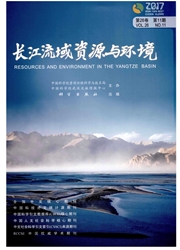

 中文摘要:
中文摘要:
水是生命之源。大河流域既是地球淡水资源的关键载体,也是人类文明发育的主要摇篮。作为世界文明古国和现代发展中大国,中国的情况更是如此。长期的实践表明,大河流域的开发具有明显的生态效应极化特征:即在人文生态系统获取快速发育的同时,严重干扰和破坏了流域自然生态的系统发育及其多样化的发展。流域开发的程度越高,这种极化效应的特征也就越明显。论文的实证分析表明,由于缺乏流域开发生态效应的正确认识和过分追求人文发展利益发育最大化,黄河和长江两大流域的资源环境承载能力正在面临着日趋严峻的挑战。例如,河水断流、水质污染、湿地萎缩和水生物种消亡。为国家现代文明的永续发展计,亟需改变目前传统的"重开发、轻保护"大河流域资源环境开发观。
 英文摘要:
英文摘要:
Water is a vital resource.River basins are both the key bodies of water resources and the major cradles of human civilizations.It is particularly true for China,one of the ancient civilizations and the most populated country in the world.A long-term practice shows that the development of river basins has significant polarized characteristics of ecological effects:our human society began to set apart from the natural river basins as technology to be widely used to solve all the problems of life,that civilization made human successful,but great costs to the river basins,while a serious interference and damage to the phylogenetic diversity of natural ecosystems and watersheds.The higher the basin development,the more obvious polarized effects it has.Based on an empirical analysis,this paper argues that due to the lack of a fully understanding of the polarized ecological effects and the pursuit of human development,the carrying capacities of the Yellow River Basin and the Yangtze River Basin have been facing more and more serious challenges,such as rivers no longer flow into the sea,water is polluted,wetlands are draining out and aquatic animals are diminishing.For a sustainable development of the river basins in China,there is an urgently need to change the concept from the traditional one emphasized with " Human development first,natural protection second" to a new one addressed on " Natural protection first,human development second".
 同期刊论文项目
同期刊论文项目
 同项目期刊论文
同项目期刊论文
 期刊信息
期刊信息
